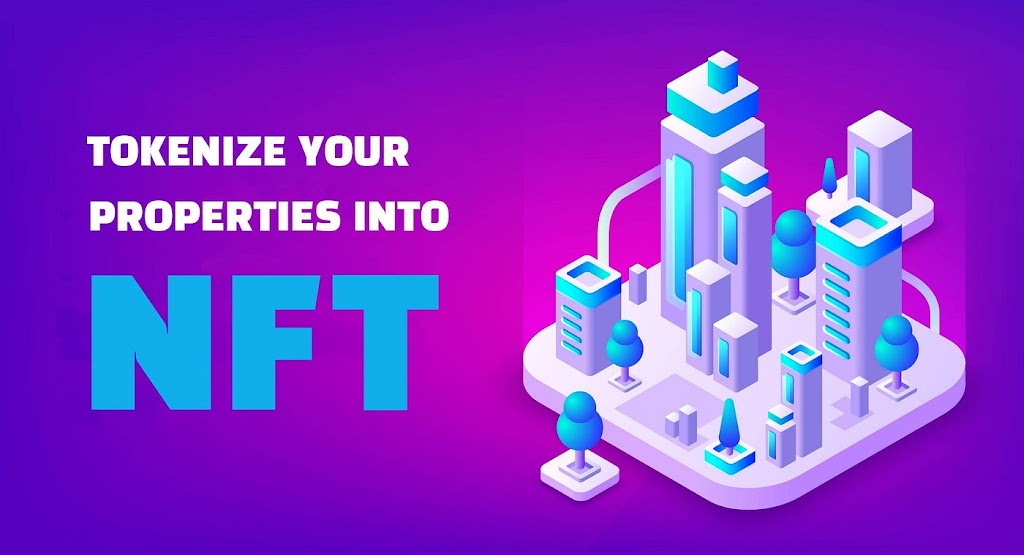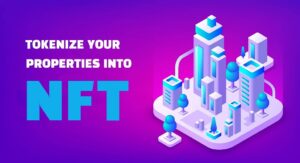Tokenizing Real Estate Through NFTs: A Comprehensive Overview
Tokenizing real estate through Non-Fungible Tokens (NFTs) represents a transformative approach to property investment and ownership. This practice leverages blockchain technology to create digital representations of real estate assets, making them accessible, divisible, and tradable. Here’s an in-depth look at how this process works and its implications:
1. Understanding Real Estate Tokenization
– Definition: Tokenization is the process of converting ownership rights of an asset into digital tokens on a blockchain. Each token represents a fractional ownership stake in the asset.
– Asset Representation: For real estate, tokenization means converting property ownership or interest into digital tokens that can be bought, sold, and traded on various platforms.
– Non-Fungible Tokens: NFTs are unique digital tokens that represent ownership or proof of authenticity for a specific asset. Unlike cryptocurrencies such as Bitcoin, each NFT is distinct and cannot be exchanged on a one-to-one basis with another NFT.
– Smart Contracts: NFTs are often created using smart contracts on blockchain platforms, which are self-executing contracts with the terms directly written into code.
– Asset Selection: Identify the real estate asset to be tokenized, such as residential properties, commercial buildings, or land.
– Legal Structuring: Ensure compliance with local real estate and securities regulations by creating legal structures like Special Purpose Vehicles (SPVs) to hold the property.
– Token Creation: Develop NFTs that represent ownership stakes or interests in the property. Each NFT might correspond to a specific fraction of the property’s value.
– Smart Contract Deployment: Deploy smart contracts on a blockchain to govern the ownership, transfer, and management of the tokens.
– Marketplace Listing: List the NFTs on a digital marketplace where investors can buy and sell them, providing liquidity and accessibility.
2. Benefits of Tokenizing Real Estate
– Fractional Ownership: Tokenization allows investors to buy fractional shares of a property, lowering the barriers to entry for real estate investment and making it accessible to a broader audience.
– Global Reach: Investors from around the world can participate in the real estate market without the need for physical presence or significant capital.
– Secondary Market: Tokenized real estate can be traded on secondary markets, providing liquidity for an otherwise illiquid asset class. Investors can buy and sell tokens as easily as they would trade stocks or other securities.
– Reduced Transaction Costs: Blockchain technology reduces intermediaries, lowering transaction costs and speeding up the buying and selling process.
– Immutable Records: Blockchain technology ensures that ownership records are immutable and transparent, reducing fraud and enhancing trust.
– Automated Processes: Smart contracts automate the execution of transactions, ensuring that terms are enforced without the need for manual intervention or third-party verification.
– Automated Distribution: Rental income, dividends, or other returns can be automatically distributed to token holders through smart contracts, simplifying property management.
– Democratized Governance: Token holders can participate in decision-making processes related to the property, such as maintenance and improvement decisions, through decentralized voting mechanisms.
– Variety of Assets: Investors can easily diversify their portfolios by purchasing tokens representing different types of real estate assets, including residential, commercial, and industrial properties.
– Risk Management: Diversification helps manage risk by spreading investment across multiple assets and geographic locations.
3. Challenges and Considerations
– Securities Laws: Tokenized real estate often falls under securities regulations, requiring compliance with laws governing the issuance and trading of securities.
– Jurisdictional Differences: Real estate and securities regulations vary widely by jurisdiction, creating complexities in structuring and managing tokenized assets.
– Blockchain Integration: Integrating real estate systems with blockchain technology requires technical expertise and significant investment in infrastructure.
– Interoperability: Ensuring that tokenized assets can be traded across different blockchain platforms and marketplaces requires developing interoperable standards and protocols.
– Awareness and Trust: Building trust in tokenized real estate requires educating investors, property owners, and regulators about the benefits and risks of the technology.
– Liquidity and Market Depth: Developing a robust secondary market with sufficient liquidity and participants is critical to the success of tokenized real estate.
– Pricing Models: Determining the value of tokenized real estate requires developing new pricing models that account for fractional ownership and digital market dynamics.
– Market Fluctuations: The value of real estate tokens can be affected by market conditions, economic factors, and changes in regulatory environments.
– Legal Ownership: Ensuring that token holders have a clear legal claim to the underlying property and that their rights are protected in the event of disputes or insolvency.
– Dispute Resolution: Developing mechanisms for resolving disputes among token holders or between token holders and property managers.
4. Applications and Use Cases
– Fractional Homeownership: Enabling individuals to invest in residential properties by purchasing tokens representing a share of a home, making homeownership more accessible.
– Rental Income Sharing: Investors can earn a portion of rental income from tokenized properties, providing a steady income stream without direct property management.
– Office Buildings and Retail Spaces: Tokenizing commercial properties allows investors to participate in high-value real estate markets that were previously inaccessible to smaller investors.
– Co-Working Spaces: Tokenization can support the development of co-working spaces by allowing multiple investors to fund and share in the revenue generated from the property.
– Crowdfunding Projects: Real estate developers can raise capital by selling tokens to investors, democratizing access to development projects and providing an alternative funding source.
– Risk Sharing: Tokenization allows investors to share the risks and rewards of real estate development, spreading the financial burden and potential profits.
– Tokenized REITs: Traditional REITs can issue tokens to represent shares, increasing liquidity and making it easier for investors to buy and sell interests in a diversified real estate portfolio.
– Global Access: Tokenized REITs can attract a global investor base, expanding access to real estate markets beyond local or regional limitations.
5. Future Prospects and Innovations
– IoT Integration: Combining IoT devices with blockchain technology to create smart properties that automatically manage utilities, security, and maintenance based on real-time data.
– Dynamic Pricing: Implementing smart contracts that adjust rental prices or service fees based on demand, occupancy rates, or other factors.
– Subscription Models: Offering real estate access through subscription-based models, where users pay for access to property rather than owning it outright.
– Flexible Leasing: Tokenizing lease agreements to allow for flexible, short-term, and fractional leasing options, catering to the needs of modern tenants.
– Peer-to-Peer Transactions: Developing decentralized platforms that facilitate direct transactions between buyers and sellers without intermediaries, reducing costs and increasing transparency.
– Governance Tokens: Issuing tokens that grant holders voting rights on platform decisions, enabling a more democratic and community-driven approach to real estate management.
– Virtual Properties: Tokenizing virtual real estate within the metaverse, allowing users to buy, sell, and develop digital land and properties.
– Cross-Reality Investments: Linking physical and virtual real estate investments, providing a bridge between traditional real estate markets and emerging digital environments.
Tokenizing real estate through NFTs has the potential to revolutionize the real estate industry by increasing accessibility, enhancing liquidity, and fostering greater transparency. While there are significant challenges to overcome, including regulatory compliance and market adoption, the benefits of this innovative approach are compelling. As technology advances and market acceptance grows, tokenized real estate could become a mainstream investment vehicle, democratizing access to one of the world’s most valuable asset classes.

